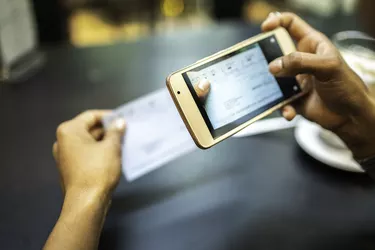
The Federal Reserve Bank of New York indicates that paper checks have become consistently more obsolete over the years, steadily giving way to electronic forms of payment. This isn't to say, however, that no one's going to present you with one of these fossilized forms of payment ever again.
Federal laws are in place to protect you against issues of fraud, but these generally address big-ticket scam artists rather than someone who's handing you a check in exchange for walking their dog. If one of these checks "clears," can it still bounce? Actually, yes, depending on your definition of "clears."
Video of the Day
Video of the Day
Tip
A check can still bounce even if your bank has made some of the funds already available to you. It will depend on whether there's ultimately enough money in the account of the check writer.
The Check-Clearing Process
Technically, a check doesn't actually "clear" unless and until the payer's bank releases the money to the recipient's bank after it's been deposited. You might see that it's "pending" if you check your account online after you've made a deposit, or it might even appear without a notation, but this doesn't necessarily mean that the money is already yours to spend as you see fit.
Your bank first accepts your deposited check, then it reaches out to the payer's bank for payment. That second bank then debits the amount from the payer's account and sends the money to your bank. This is the point at which the check is deemed to have cleared.
Some banks will make at least some of the funds available to you rather quickly, usually within a day or two and sometimes before the actual transfer of money has taken place. Your account might be immediately credited with the first $100 or $200 of a fairly large check. But this doesn't guarantee that the money has been received from the payer's bank.
Sometimes checks can be held longer, such as if you only recently opened the bank account to which you've deposited one, or if you're trying to deposit a check a second time because it's bounced before. In fact, if a check bounces, the bank will try to collect on it a second time in some cases.
What Could Go Wrong?
A bank can and will reverse a check deposit if it doesn't receive the money from the other bank. Depending on your balance before you made the deposit, your account might be overdrawn if you've tapped into that deposited money but the other bank doesn't remit the funds. And yes, you're responsible for paying the bank any overdraft fees that might result.
Precautions and Solutions
It goes without saying that you might want to be cautious about accepting a check from someone you don't know well. Even if you do know the payer – they might be your sister or your best friend – don't assume that a check has cleared your account and make transactions on the money unless at least five business days have passed and that credit is still showing up in your bank account.
Better yet, call the payer's bank and inquire about the check's status to find out if it's cleared on that end before you tap into the money. You can also inquire at your own bank to find out exactly what their process and timeline is for clearing a deposited check for safe withdrawal. Its funds availability requirements should be posted on its website.
Of course, you're in a much safer position if the check is drawn on an account that's with the same bank you use. In this case, you can pretty much rest assured that your bank will know if the check is good well before five days have passed.